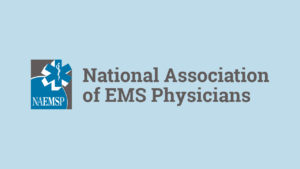Dear NAEMSP Members, Fellow EMS Physicians and EMS Clinicians:
I am taking a moment to share my thoughts and concerns regarding the recently published Urban Chiefs Forum and NFPA document regarding the elevation of head and torso during CPR. I am troubled by the recommendations concerning this practice as the “standard of care.”
It is concerning that a non-clinical forum is asserting a stance on EMS medicine standards, especially with regards to the utilization of specific devices or techniques for the care of victims of cardiac arrest. This raises questions about the appropriateness of their involvement in ongoing scientific dialogues that directly impact patient care. It is crucial that EMS physicians maintain a strong voice in determining the best practices and standards for our field.
Furthermore, the involvement of non-clinical forum in making statements about our practice sets a potentially dangerous precedent that could create pressure from non-clinical leaders and elected officials to adopt clinical practices that are not based on strong scientific evidence. As dedicated EMS clinicians, we understand the importance of evidence-based medicine and the need for rigorous evaluation before endorsing widespread adoption of clinical practices based on preliminary observational evidence that almost always has major limitations due to bias.
Any publication that calls for a recognized and accepted widely applicable standard of care should include authorship as well as disclosure of conflicts of interest. Without such information, it becomes challenging to fully evaluate the objectivity of the position statement.
Developing new and innovative methods to improve patient care and outcomes is exceedingly important – but it must be done through a scientific method that is valid and unbiased before advocating for widespread adoption in clinical practice. The concept of elevating the head and torso during CPR is certainly provocative and represents disruptive thinking that may potentially be important as we seek to improve outcomes from cardiac arrest.
EMS physician oversight is crucial in interpreting and effectively implementing new interventions within our communities.
Thank you for all you do,
José G Cabañas MD, MPH, FAEMS
NAEMSP President

